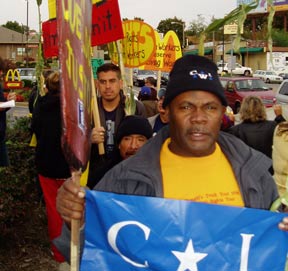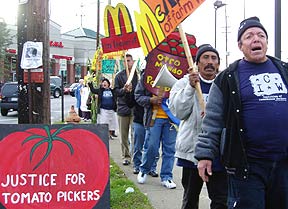CIW TO McDONALD’S:
“SWEATSHOP TOMATOES ARE BENEATH
THE GOLDEN ARCHES!”
|
WEEK IN REVIEW – GREATER CHICAGO AREA, IL
In terms of action, the highlight of the week was undoubtedly Day 6 in front of McDonald’s global headquarters in Oak Brook. Be sure to check out the complete Day 6 report as well as the 3-minute video chronicling the powerful protest – click here to watch the video of the hands that harvest McDonald’s tomatoes continuing the work of building a more just food industry! |
Click here for a complete report on the Day 7 protests, including the tour’s first brush with some Confederacy-loving counter-protestors!… |
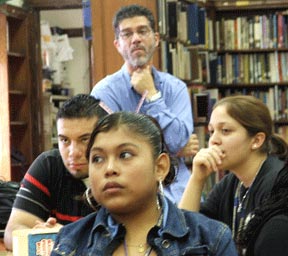 The days leading up to our actions in Oak Brook and Chicago were spent in classrooms and faith communities, building awareness about the brutal working conditions and sub-poverty wages in McDonald’s supply chain. In the span of just a few days, the tour crew visited over 15 high schools and colleges, with events ranging from intimate classroom discussions… |
Click here for a full report from Days 4 & 5! |
 In addition to schools, the tour crew also made the rounds in Chicago area churches and synagogues. Above, Cruz Salucio of the CIW addresses the Chicago Presbytery meeting about the escalating McDonald’s campaign. The Presbytery is the governing body for over 106 Presbyterian Churches and 39,000 Presbyterians in the Chicago area. |
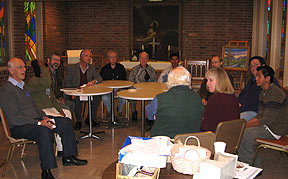 CIW members also spoke at both the United Church of Christ’s Chicago Metropolitan Association biannual meeting, which represents 108 UCC congregations, and an area clergy meeting of the Fox Valley Association of the United Church of Christ, pictured here above. The Fox Valley Association was an early endorser of the Alliance for Fair Food. |
 Finally, on our last day in Chicago, CIW members addressed nearly a dozen faith communities throughout McDonald’s own backyard – the Western and Northern Chicago suburbs. From Catholics in La Grange and Western Springs to Jewish allies on Chicago’s Northshore, the CIW was received with excitement and promises of growing involvement in the Campaign for Fair Food. The Tour crew’s work – including signing up new allies, as seen here in the picture above, to the ever-growing CIW listserve – continued well into the afternoon, as CIW members spoke with Methodist Churches throughout the Chicago area that had come together at the Northern Illinois Conference’s annual Mission Fair. |
This picture says it all. We met hundreds of young people just like this litle girl who are no longer willing to believe the Happy Meal hype and will be part of this campaign for years to come – or as long as it takes to convince the burger giant that the egregious exploitation behind their food can no longer be obscured by shiny toys and catchy marketing jingles. And behind each one of these young people are many, many more adults ready to stand side-by-side with workers from Immokalee in the coming fight for Fair Food. Scroll down for day-by-day reports from the 2006 McDonald’s Midwest Tour. |
|
DAY 7 – THE STREETS OF CHICAGO, IL
On Day 7, farmworkers from Immokalee and a growing number of local allies held four separate – consecutive – McDonald’s protests, crisscrossing the Windy City from morning to evening for eight solid hours of action that raised the awareness of tens of thousands of Chicagoans and will form the foundation of the struggle for fair food in McD’s backyard for months and years to come. |
For the complete story on Ag-Mart and the “crowded, squalid housing” for the workers who pick McD’s grape tomatoes, check out the Day 6 update. |
|
And it is this movement – a movement of organized workers and informed, mobilized consumers – that will ultimately bring industry leaders like McDonald’s to use their influence to demand more modern, more humane conditions for the workers who pick the produce they sell to the public. |
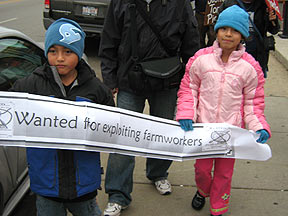 And judging by the response from tens of thousands of Chicagoans on Day 7, it is a movement that consumers are quick to embrace. (Of course, it certainly doesn’t hurt that we have such adorable messengers…) |
|
Of course, some people just love their McDonald’s, regardless of the exploitation hidden behind the logo. These proud sons of Dixie chanced upon the second protest of the day, and their encounter with the Tour crew prompted them to abandon their otherwise full schedule and mount a spontaneous counter-demonstration, declaring their unconditional loyalty to the Golden Arches. Such wonderful company (the hat on the left was accompanied by the novelty license plate on the front of their truck depicting a Confederate flag with the word “Redneck” emblazoned across the front)… |
As the Campaign for Fair Food continues to grow and evolve, one thing is increasingly clear: this movement won’t stop until justice and dignity prevail in the fields of Florida.
|
|
DAY 6 – McDONALD’S GLOBAL HQ
One hundred years later, as the McDonald’s Midwest Tour made its way to Chicago, a story broke in North Carolina documenting the “crowded, squalid housing” conditions faced by workers in the tomato industry, specifically workers for tomato giant Ag-Mart. The reporter found, “many of Ag-Mart’s workers live crowded in fly- and roach-infested dwellings.” The picture above comes from housing where 30-40 workers lived, “with no hot water, no shower, and not enough beds.” The article didn’t specify who buys the tomatoes picked by Ag-Mart workers, but we will: Ag-Mart is a major supplier of grape tomatoes to McDonald’s. Click here to read about the relationship between McDonald’s and Ag-Mart in the New York TImes article (2/20/05), “You Want Any Fruit with That Big Mac?” |
And so our campaign to make fast food fair food continues. And every time McDonald’s denies the truth of exploitation in Florida’s fields and refuses to sincerely address these issues together with the CIW, it makes our campaign even stronger by providing new opportunities to build awareness and bring new allies to the struggle, like this young man pictured here who joined us with his mother and her friends on Day 6 for the protest outside McDonald’s global headquarters in Oak Brook, Illinois. His presence provides us with a moment for reflection. Imagine the bath you see on the left being the bath that his mother bathes him in everyday. It’s almost unimaginable, isn’t it? However that’s the reality for thousands upon thousands of children whose parents work in fields across the country, harvesting tomatoes and other fruits and vegetables. That’s what we’re fighting to change. |
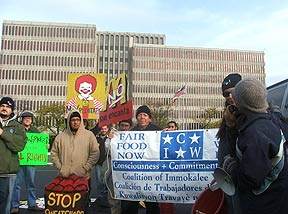 And so it is that we gathered again in the big parking lot outside McDonald’s headquarters, only this time… |
|
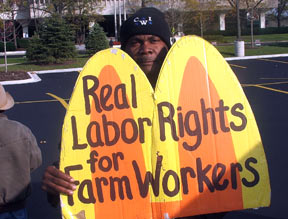 … replaced instead by a light breeze and sunny skies, which lifted our spirits and illuminated our message. |
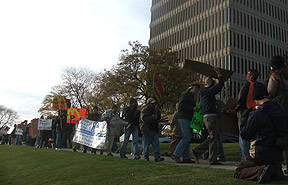 We made our way to the front of the McD’s building for the start of the protest… |
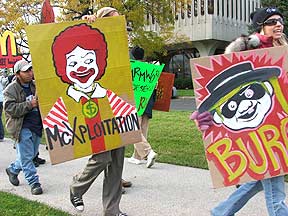 … equipped with colorful new signs created by our Chicago allies… |
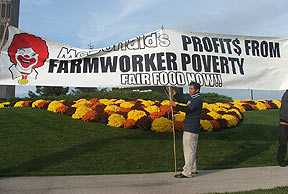 … that left no doubt about our message for the thousands of commuters who witnessed the protest that day. |
 Following a two-hour long picket, we wrapped up the action, gathering for a final message to McDonald’s executives watching the protest behind smoked windows and a perimeter secured by guards. Allies spoke first, including Olgha Sandman, Vice President of National Farm Worker Ministry and a steadfast friend of the CIW for many years… |
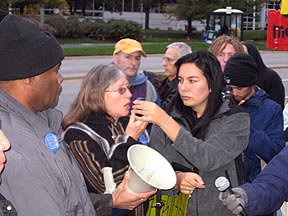 … as well as newer allies, such as Professor Krieglestein of the College of DuPage. Professor Krieglestein, who attended the protest with several DuPage students, reminded McDonald’s of the preparedness of students to carry the struggle to the next level, if necessary. |
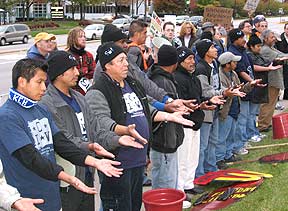 But the last word was saved for the workers who made the trip from Immokalee and who, in a remarkably moving statement, used their hands to convey their message to the men and women who work at McDonald’s headquarters and make the decisions that either continue to impoverish communities like Immokalee, or provide a path toward a more equitable food industry… |
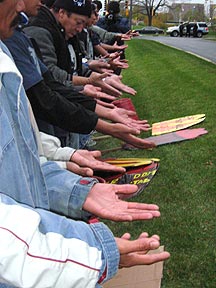 … hands that tell the story of the brutally difficult and undervalued labor that forms the base – harvest after harvest – of McDonald’s billion-dollar enterprise… hands that are indeed rewriting the rules of that industry from the bottom up. |
|
|
Watch the video report from Day 6 here! (Click here to see the video in larger dimensions.) |
|
DAYS 4 & 5 – GREATER CHICAGO AREA, IL
|
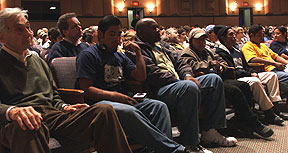 … and in this case, the person we shared that stage with was quite a star in his own right. That’s Howard Zinn on the far left of the picture, author of the incomparable, “A People’s History of the United States,” and our partner in presentation on our first night in Chicago at Northwestern University. |
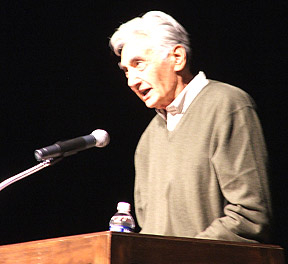 Professor Zinn, an early and leading endorser of the Alliance for Fair Food, spoke of the challenges facing our democracy and lamented the abuse of U.S. power in the world today. |
|
|
|
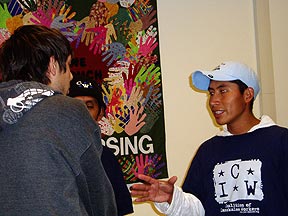 … to intense one-on-one discussions, CIW members spread the word about the Campaign for Fair Food… |
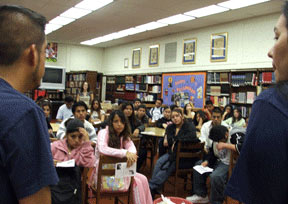 … a message heard loud and clear by an audience of special import to McDonald’s – the young people that the fast-food giant relies on to give its brand currency… |
 … and whose minds are still open when it comes to the decisions that will shape their lives as consumers in the years to come. |
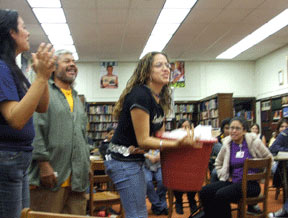 In order to convey the grueling reality of picking two and a half tons of tomatoes per day – 32 lb. bucket by 32 lb. bucket – just to earn minimum wage, workers invited students to lift one bucket… |
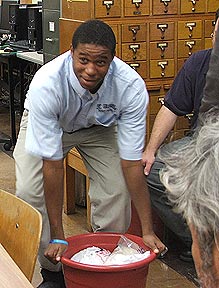 … a task that left even the fittest students convinced of the fundamental injustice of a 40 cent piece rate that hasn’t significantly changed in nearly 30 years. |
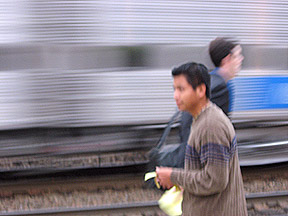 But not all our time was spent in presentations. We also hit the streets, flyering at metro stops… |
 … where early morning rail commuters had an unexpected opportunity to think critically about the food they eat…. |
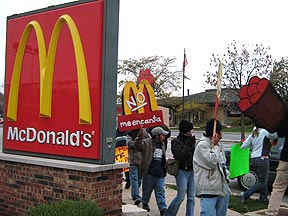 … and picketing outside several McDonald’s restaurants… |
Next up – action at McDonald’s global headquarters! In the meantime, don’t miss the new tour press release, “McDonald’s tomato supplier exposed: North Carolina paper finds Ag-Mart pickers living in ‘squalid’ conditions.” |
|
DAY 3 – URBANA-CHAMPAIGN, IL
|
While this group paused for an outright corny photo-op (sorry… probably should have resisted that one…), the rest of the Mini-Tour pressed onward to Chicago to promote the upcoming weekend actions and share the stage at an event with Howard Zinn, acclaimed historian and author of “A People’s History of the United States.” (We’ll have more on that tomorrow!…) |
|
|
|
|
|
To read more about the growing Chipotle campaign, including reports and analysis from the CIW’s recent Denver tour, click here! |
|
|
|
|
|
Chicago, Chicago… here we come. Check back soon for updates from the Windy City as the Mini-Tour closes in on McDonald’s global headquarters! |
|
DAY 2 – CARBONDALE, IL
|
But through these exchanges, it quickly became evident that many young people are already looking beyond McDonald’s billion-dollar marketing hype… |
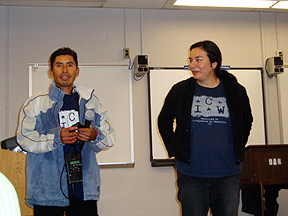 … and seeing the reality of exploitation behind the Golden Arches, especially after hearing directly from farmworkers and learning of the irrefutable connection between their grinding poverty and the high-volume, low-cost purchasing practices of the fast-food industry. |
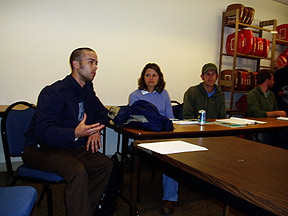 In addition to presentations from the CIW, tour members from Student/Farmworker Alliance – the national network of students and youth in partnership with the CIW – were also on hand to share lessons from the popular “Boot the Bell” campaign, which blocked or removed Taco Bell restaurants from 22 college and high school campuses during the four-year boycott, including the University of Chicago, the University of Notre Dame, and UCLA. |
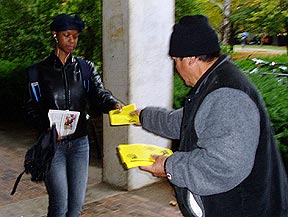 Throughout the day, the workers from Immokalee and their allies encountered thoughtful students who understood the unique relevance of the McDonald’s campaign to student life at Southern Illinois. |
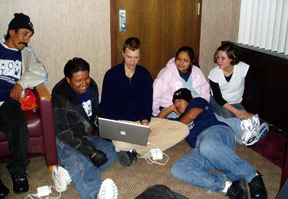 In addition to raising awareness through dozens of classroom presentations and one-on-one discussions, the tour crew was keeping tabs on the previous day’s press coverage in Louisville. (In case you missed it, be sure to check out the Courier-Journal article, “Farmworkers pressure McDonald’s”) |
|
|
|
|
|
|
|
|
|
|
|
|
|
|
Check back soon for the next update, as the Immokalee crew gets one stop closer to the Windy City and the big house – McDonald’s HQ! |
|
DAY 1 – LOUISVILLE, KY
View the coverage and photos in the Louisville Courier-Journal (10/16), “Farmworkers pressure McDonald’s” |
|
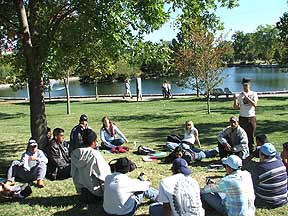 Taking to heart the ancient Greek traditions of education and reflection, the CIW stopped in Nashville’s Centennial Park to reflect on the history of the CIW, the unfolding Campaign for Fair Food, and the significance of the Mini-Tour in light of McDonald’s ongoing refusal to work with the CIW to ensure real rights for farmworkers. |
And building on the wave of recent support for the campaign, the Kentucky Interfaith Taskforce on Latin America & the Caribbean announced its formal endorsement of the Alliance for Fair Food! |
|
|
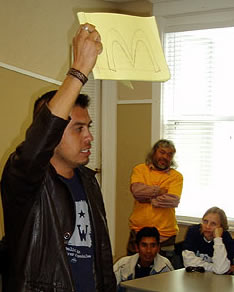 After an extended question-and-answer session, which covered everything from the marketing strategies of corporations such as McDonald’s to the groundbreaking agreement with Taco Bell to the immigrant rights movement, it was time to translate discussion into action in the streets (or sidewalks, rather) of Louisville. |
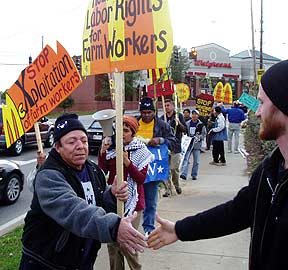 As has been the case in years past, the CIW received an extremely warm and heartfelt welcome from longtime Louisville allies… |
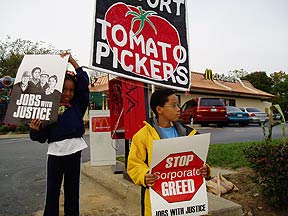 …including some of the youngest (and cutest) members of Louisville’s Fair Food movement. Although they couldn’t recall everyone’s names, these two budding activists could recall the many times prior to the 2005 Taco Bell boycott victory that the CIW came to town to visit Taco Bell’s parent, Louisville-based Yum Brands. |
|
|
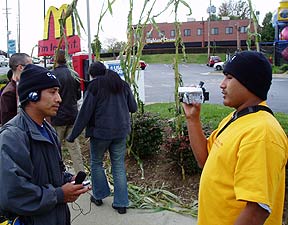 … while Emmanuel Cortes gathered footage for a forthcoming CIW video documenting the struggle for fair food. (Click here if you haven’t seen the CIW’s most recent video, “Ronaldo the Clown!”) |
|
|
|
|
|
|
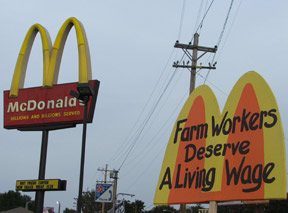 It is precisely this contradiction between super-sized profits and dehumanizing poverty that McDonald’s will have to acknowledge and address in the weeks, months, and years ahead – treating farmworkers in their supply chain not as children or as threats, but as full human beings with dignity, aspirations, and the basic right to participate in the decisions that affect their lives. |
Check back soon for updates from Days 2 & 3 as the Mini-Tour visits Southern Illinois University and the University of Illinois at Urbana-Champaign! |

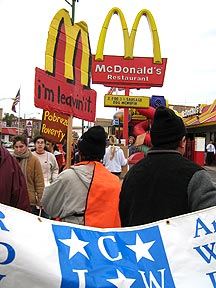
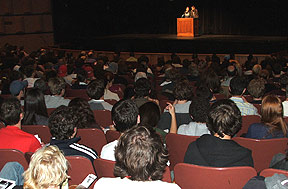
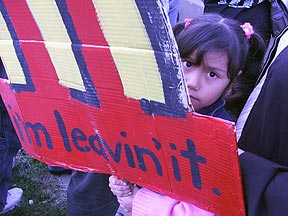
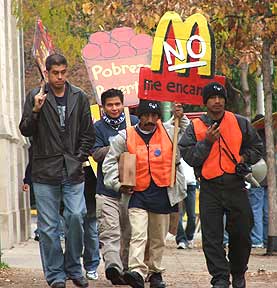
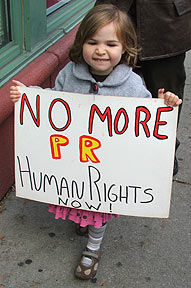
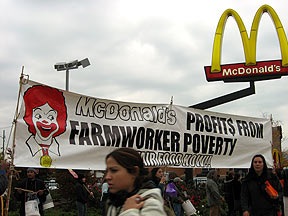
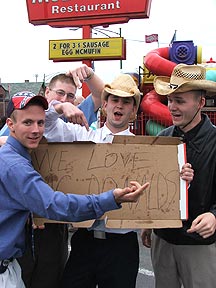
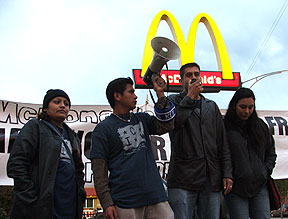


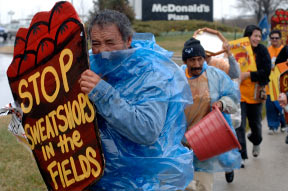
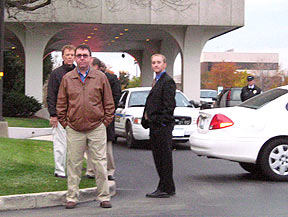
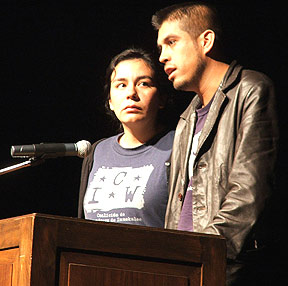
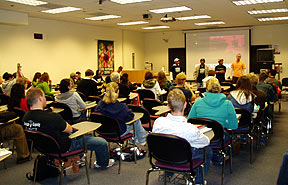
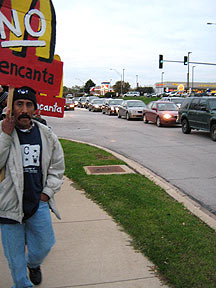
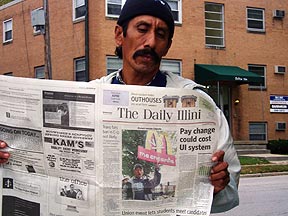
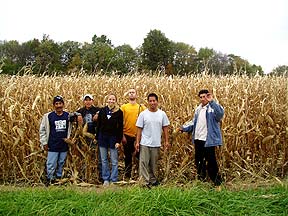
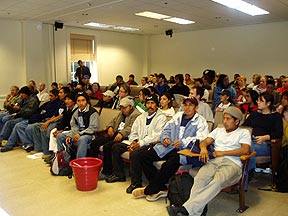
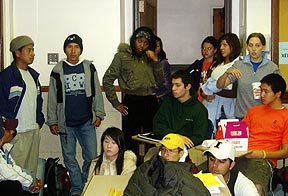
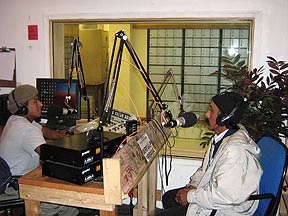
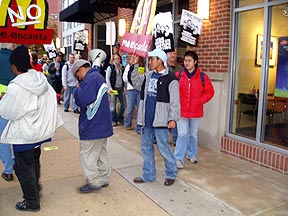
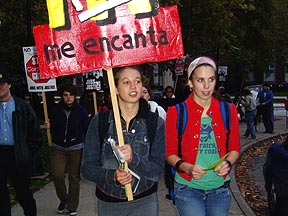
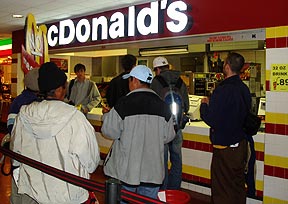
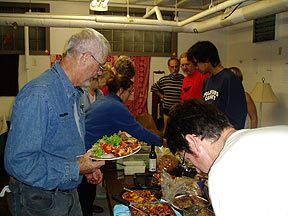
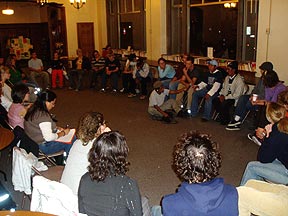
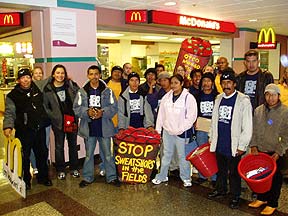
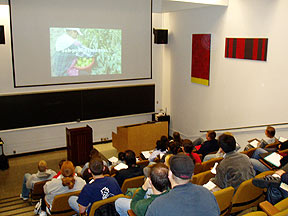
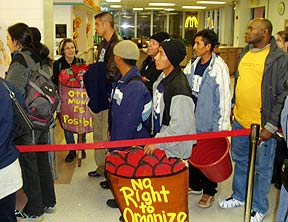
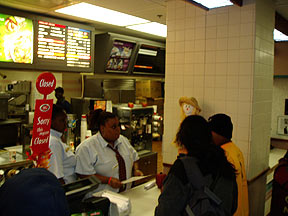 As quickly as it began, the mission ended – with success. The impromptu human rights delegation delivered the signed letter to the on-duty manager, outlining the conditions in Florida’s fields and the actions McDonald’s needs to take to ensure real rights for farmworkers. Judging by the commitment of our new friends at SIU, this installation of the Golden Arches can surely expect increasing attention in the months ahead.
As quickly as it began, the mission ended – with success. The impromptu human rights delegation delivered the signed letter to the on-duty manager, outlining the conditions in Florida’s fields and the actions McDonald’s needs to take to ensure real rights for farmworkers. Judging by the commitment of our new friends at SIU, this installation of the Golden Arches can surely expect increasing attention in the months ahead.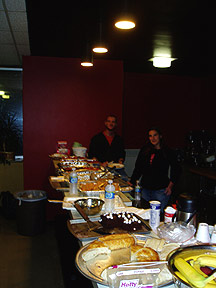
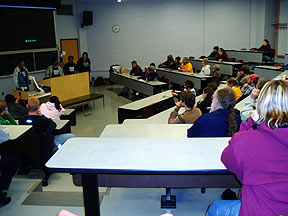
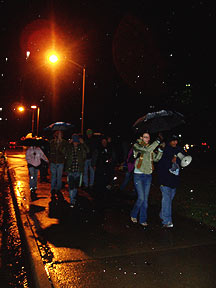
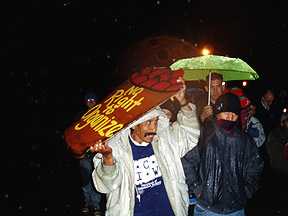 Protest art doubled as makeshift rain shields (at least for those who left their umbrellas behind in Immokalee)…
Protest art doubled as makeshift rain shields (at least for those who left their umbrellas behind in Immokalee)…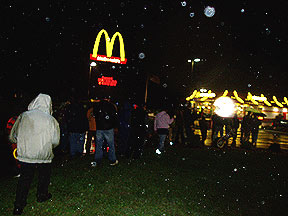
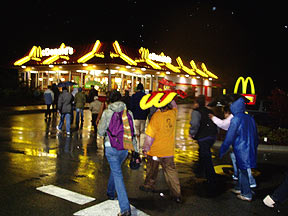
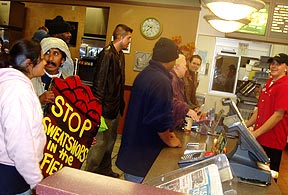 The delegation gave this worker (who seemed none too displeased) a break today…
The delegation gave this worker (who seemed none too displeased) a break today…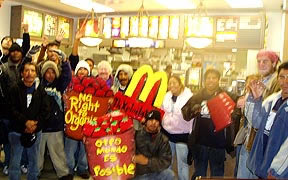
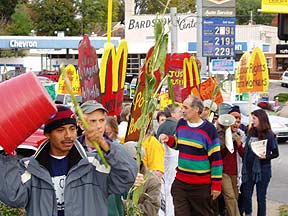

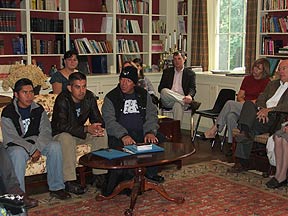
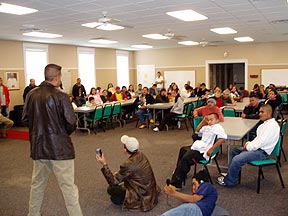
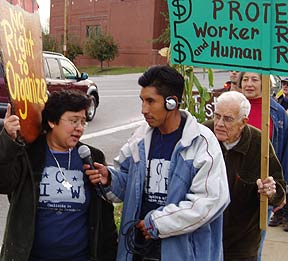
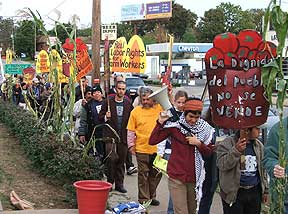
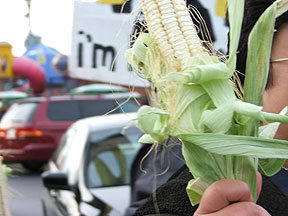 Yes they are. In addition to its earthly contrast to McDonald’s plastic aesthetic, the locally harvested corn served as a powerful symbol linking together the livelihoods of small farmers and farmworkers. In a highly consolidated food system, both groups are being squeezed by immense market forces. On the one hand, small independent farmers are increasingly unable to depend on local markets nor can they compete with large corporate farms for contracts with high-volume buyers such as McDonald’s and Wal-Mart. Meanwhile, these mega-buyers’ insatiable, year-round appetites for cheap fresh produce – regardless of the labor conditions under which the crops are picked – further drive down farmworkers’ sub-poverty wages.
Yes they are. In addition to its earthly contrast to McDonald’s plastic aesthetic, the locally harvested corn served as a powerful symbol linking together the livelihoods of small farmers and farmworkers. In a highly consolidated food system, both groups are being squeezed by immense market forces. On the one hand, small independent farmers are increasingly unable to depend on local markets nor can they compete with large corporate farms for contracts with high-volume buyers such as McDonald’s and Wal-Mart. Meanwhile, these mega-buyers’ insatiable, year-round appetites for cheap fresh produce – regardless of the labor conditions under which the crops are picked – further drive down farmworkers’ sub-poverty wages.